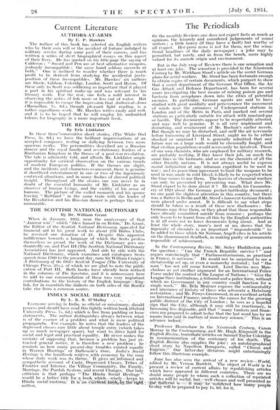- The Periodicals
Or the monthly Reviews one does not expect facts so much as opinions, the leisurely and considered judgements of sound writers ; a little heavy (if they have a fault) but worthy of all respect. Hot-press news is not for them, nor the sensa- tional headlines of the daily newspaper ; a joke may be permitted, but rarely, and as from the bench, more highly valued for its austere origin-and environment.
But in the July crop of Reviews there is one sensation and at least one joke. The sensation is provided in the Nineteenth Century by Mr. Wickham Steed's article on the secret German plans for aerial warfare. Mr. Steed has been fortunate enough to obtain copies of certain documents, which purport to show that a secret department of the German War Office, the Air Gas Attack and Defence Department, has been for several years investigating the best means of raining poison gas and bacteria from aeroplanes down into the cities of potential enemies. In particular, German agents are said to have studied with great assiduity and perseverance the movement of winds near the entrances of Underground stations in London and of the Metro in Paris, and marked out several stations as carticularly suitable for attack with mustard-gas or bacilli. The documents appear to be respectably attested, and may well be genuine. It is all very unpleasant and disturbing, and reminiscent of Mr. Buchan's earlier novels. But though we may be disturbed, and sniff the air nervously before burrowing at Liverpool Street, ought we to be either shocked or surprised ? It is generally admitted that any future war on a large scale would be chemically fought, and that civilian populations would necessarily be involved. Those of our own chemists, .who- are employed for military research, are probably working, if they know their job, on much the same lines as the Germans, and so are the chemists of all the other frkndly nations. It is not always useful to express moral indignation at any inhuman expedient to be used in war ; and no peace-time agreement to limit the weapons to be used in war, made in cold blood, is likely to be respected when the time comes to use them. The horrors of chemical warfare can only be prevented by preventing war. What does Mr: Steed expect to be done about it ? He recalls his Cassandra- cry of 1929 about the German pocket-battleship document ; no one paid the slightest attention in this country, but there was a flutter in Berlin and Mr. Steed's innocent German friends were placed under arrest. It is difficult to say what steps should be taken as a result of these new disclosures : the Germans may deny them, or they plead that those responsible have already committed suicide from remorse ; perhaps the only lesson to be learnt from all this by the English authorities is at all costs not to leave documents lying about. And at ,least the whole story, mare's.. nest or no, shows that the ingenuity of chemists is .an important " imponderable " to be added to those which Sir Norman Angell cites in his article on the disarmament deadlock, as making parity of armaments
impossible of achievement: •
In the Contemporary Review, Mr. Sisley Huddleston puts the question : Can the French Republic survive ? " and argues convincingly that " Parliamentarianism, as practised in France, is outworn." He would not be surprised to see a dictatorship set up, or even a-monarchy restored ; but " the man "- has not yet come- forWard. Lord Davies uses Man- chukuo 'as yet another argument for an International Police Force under the control of the,League of Nations : " Give the League these institutions; a tribunal and a police force, without which no Government in any country could function for a single -week." ,' Mr: Bela-Mentzer exposes the sentimentality and ignorance of history-of those who advocate a Habsburg .restoration ; and Mr. Powys Greenwood, in an excellent article on-International Finance; analyses the causes for the growing public distrust of the City of London ; he sees as a hopeful 'sign that the City, although it may still be reactionary, is becoming less dogmatic, anti that " many bankers and finan- ... eters are prepared to admit today that the last word-has by no Means been said in Matters of monetary science.". This is an
advanee •
' Professor Hearnshaw in .the Nineteen th Century,- Canon Murray in the Contemporary, and Mr. Hugh.Kingsmill in the Englishfieview,Zontributearticles on Samuel Taylor Coleridge in commemoration - the-• centenary of his death. • The .Vnglish. Review also,snmilies the joke : an autobiographical 'short _story by Napoleon Bonaparte, called " Clisson and Eugenie. Our latter-day -dictators might entertainingly follow this illustrious example.
June has also seen the arrival of a new review—World, edited by Mr. Vernon Bartlett. The object of World is to Present a review of current affairs by republishing articles which have appeared in different countries. There are no doubt many people to whom such a collection of reprinted articles will be useful, but—well chosen and well presented as ..th#.'frittferiall -is -71.":it 'Wdfrdered tow 'many peoplit. to-day will be prepared to pay ls. 6d. for it.










































 Previous page
Previous page